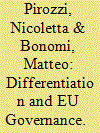| Srl | Item |
| 1 |
ID:
183852


|
|
|
|
|
| Summary/Abstract |
Existing literature on differentiated integration has made an important contribution in theorising and operationalising its regulatory dimension. However, in order to fully evaluate the impact of differentiation on EU governance, this approach needs to be enriched with additional elements. The organisational element allows us to grasp the different forms, venues and actors of differentiation. The constitutional element connects the different forms of differentiation to the foundations of EU constitutionalism and identity. The socio-political element goes beyond the analysis of differentiation as a policy practice and qualifies it as a policy choice. On this basis, a generalisation is proposed resulting from a comparative analysis of a wide range of contributions in different policy sectors in order to assess differentiation in the EU’s governance against three main criteria: effectiveness, sustainability and accountability/legitimacy.
|
|
|
|
|
|
|
|
|
|
|
|
|
|
|
|
| 2 |
ID:
183843


|
|
|
|
|
| Summary/Abstract |
We present here the key theoretical underpinnings and general approach of the Special Issue “Governing Differentiation and Integration in the European Union: Patterns, Effectiveness and Legitimacy”, which collects contributions of a group of experts and scholars from the Horizon 2020 EU IDEA – Integration and Differentiation for Effectiveness and Accountability project. The key concepts for the analysis are clarified, namely differentiation, differentiated integration, effectiveness, legitimacy and sustainability. The basic claim of the Special Issue is that differentiation is not only necessary to address current challenges more effectively by making the Union more resilient and responsive to citizens. By introducing a useful degree of flexibility in the complex EU machinery, differentiation is also desirable, so long as such flexibility is compatible with the core principles of EU constitutionalism and identity, sustainable in terms of governance and acceptable to EU citizens, member states and affected third partners.
|
|
|
|
|
|
|
|
|
|
|
|
|
|
|
|